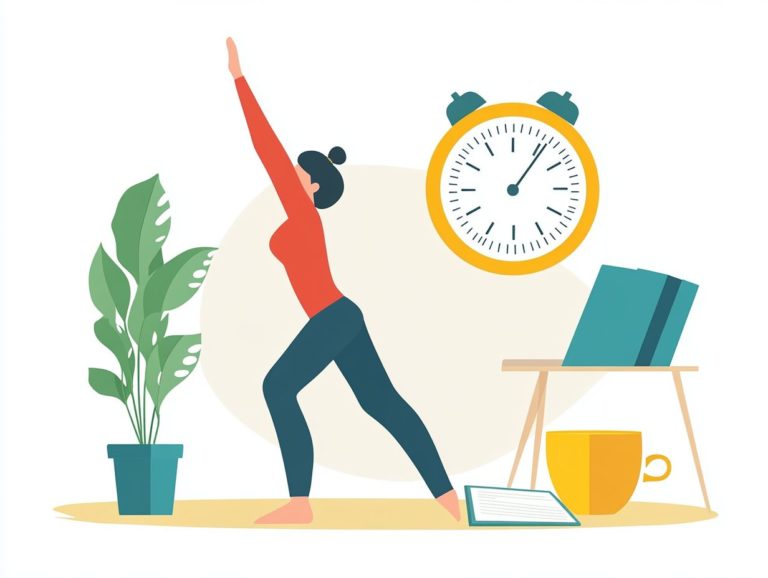5 Essential Skills for Productivity Mastery
In today s fast-paced landscape, mastering productivity is essential for your success. This article delves into five fundamental skills time management, prioritization, goal setting, organization, and focus that can revolutionize how you work and live.
You ll discover how to develop these skills, identify common obstacles that may stifle your productivity, and create an environment that nurtures success. You will also see long-term benefits of refining these abilities, showcasing their relevance across diverse areas of your life.
Immerse yourself in this journey to unlock your full potential today!
Contents
- Key Takeaways:
- 1. Time Management
- 2. Prioritization
- 3. Goal Setting
- 4. Organization
- 5. Focus and Concentration
- How Can These Skills Be Developed and Improved?
- Frequently Asked Questions
- What are the five key skills for mastering productivity?
- How can time management improve productivity?
- Why is goal setting important for productivity mastery?
- What is the role of prioritization in productivity mastery?
- How does focus contribute to productivity mastery?
- How can organization skills improve productivity?
Key Takeaways:

- Master time management to boost your productivity! Prioritize tasks, set realistic goals, and stick to a schedule to make the most of your time.
- Effective prioritization ensures important tasks are completed first. Use tools like the Eisenhower Matrix, which helps you prioritize tasks based on urgency and importance, to identify urgent and important tasks, and delegate or eliminate nonessential tasks.
- Goal setting helps define your priorities and motivates you to stay focused. Set SMART (specific, measurable, achievable, relevant, and time-bound) goals for better productivity.
1. Time Management
Time management is an essential skill that can elevate your personal and professional productivity in today s fast-paced work environment, where distractions and decision fatigue can greatly undermine your performance and well-being.
By employing effective time management techniques like the Eisenhower Matrix and time blocking, you ll be able to prioritize tasks with precision and allocate your mental energy wisely. Utilizing digital tools such as Monday.com and Shoeboxed, along with frameworks from FranklinCovey, allows you to create a system that harmonizes work and self-care, ultimately nurturing a healthy work-life balance.
Try the Pomodoro Technique, which breaks work into short, focused intervals typically 25 minutes followed by brief breaks. This approach can significantly enhance your concentration and help prevent burnout. It s crucial to minimize distractions; silencing notifications or establishing a dedicated workspace can greatly improve your ability to focus.
Managing your energy levels is equally important. Regular physical activity and mindfulness practices can recharge your mindset, keeping you at your best. Effective planning not only reduces stress but also lays out a clear roadmap for success, guiding you toward peak productivity and job satisfaction. This way, every moment spent working becomes meaningful and fulfilling.
2. Prioritization
Mastering prioritization techniques is crucial for effective decision-making and elevating both your personal and employee productivity. This skill allows you to concentrate on high-impact choices that resonate with your SMART goals.
Two standout techniques that can significantly enhance your approach are the Ivy-Lee Method and the Pareto Principle. The Ivy-Lee Method suggests that you conclude each day by identifying your six most important tasks for the next day. This practice ensures you stay focused on meaningful activities instead of getting bogged down in busywork.
On the other hand, the Pareto Principle, commonly known as the 80/20 rule, highlights that 80% of results stem from just 20% of your efforts. By implementing these methods, you can effectively manage your workload, significantly reduce burnout, and enhance your focus all while driving daily goal achievement with greater ease.
Start applying these techniques today and watch your productivity soar!
3. Goal Setting
Goal setting is a pivotal process that enhances both personal and employee productivity by providing clarity and direction through the SMART framework. SMART is a way to set clear goals by making sure they are Specific, Measurable, Achievable, Relevant, and Time-bound.
By embracing this structured approach, you can express your goals more effectively. This will significantly boost your overall productivity. For example, if you re part of a project team that establishes clear milestones within a defined timeline, you re likely to achieve your goals with greater efficiency.
Effective communication is crucial; when you and your team members discuss progress, challenges, and strategies openly, you foster a teamwork atmosphere that keeps everyone aligned on shared objectives.
Goal setting is equally valuable in personal contexts, such as striving for fitness targets or pursuing professional development. Ultimately, clarity, collaboration, and commitment are the key components that lead to successfully reaching your desired outcomes.
4. Organization

Effective organization serves as a cornerstone of your productivity habits, allowing you to streamline task management, leverage digital productivity tools, and implement efficient delegation. This ultimately cultivates a supportive work environment.
Integrating organizational systems like Kanban boards or task management applications can significantly ease your workflow by visualizing progress and priorities. Maintaining a clutter-free environment both on your desk and in your digital spaces is crucial for minimizing distractions. This enables you to focus on the tasks at hand.
Efficient delegation helps distribute your workload more evenly and boosts your skills while making you feel more invested in your work. By cultivating these practices, you can reduce stress levels and achieve a noticeable improvement in your overall productivity, leading to more successful outcomes in your projects.
5. Focus and Concentration
Developing focus techniques is essential for you to master attention management, helping you cut distractions and boost your mental energy. This is key to hitting your productivity targets and meeting your daily goals.
By incorporating methods such as time blocking and the Pomodoro Technique, you can strategically allocate specific intervals for focused work, followed by short breaks that foster an efficient workflow. Mindfulness plays a pivotal role in sustaining your concentration. It encourages present-moment awareness that helps clear mental clutter and enhance your cognitive abilities.
Creating an environment with minimal distractions like a tidy workspace, limited notifications, and dedicated quiet time will elevate your productivity even further. This approach allows you to delve deeper into your tasks and maintain that hard-won focus for longer periods.
How Can These Skills Be Developed and Improved?
Developing and enhancing your productivity skills requires a multifaceted approach that includes online education, dynamic development, and engaging strategies that promote mindfulness and effective communication in both your personal and professional life.
To elevate these essential skills, explore a variety of online courses focused on:
- Time management
- Focus techniques
- Collaborative tools
Workshops can also offer invaluable hands-on experiences, allowing you to apply theories in real-world situations. Continuous learning is crucial; by regularly assessing your progress through self-evaluation exercises, you can pinpoint your strengths and identify areas for growth.
Incorporating mindfulness practices, such as meditation or focused breathing, can significantly enhance your concentration levels. Honing effective communication techniques through role-playing or feedback sessions will further sharpen your ability to convey ideas clearly and maintain productive relationships.
Start honing your productivity skills today to see immediate results!
What Are the Common Obstacles to Productivity?
Common obstacles to your productivity include distractions, decision overload, and poor ways to handle stress. These can lead to burnout and impede both personal and employee productivity.
In today s fast-paced world, you may often feel overwhelmed by the relentless stream of notifications from your smartphone or social media. This makes it increasingly challenging to focus on the tasks at hand. Getting too many emails can overwhelm you with choices, whether it s figuring out which tasks to prioritize or how to respond to each message.
To tackle these challenges, it s essential for you to incorporate effective stress management techniques, such as mindfulness meditation (focusing your mind to reduce stress), which promotes clearer thinking. Additionally, time-blocking strategies allocate specific periods for concentrated work. By cultivating a supportive environment, you can sustain your motivation and ensure that your personal and professional goals are more easily attainable.
How Can One Create a Productive Environment?

Creating a productive environment is essential for enhancing your focus techniques and task organization. This significantly impacts your personal productivity and the overall quality of your work environment.
Factors like keeping your workspace tidy, proper lighting, and minimizing noise play crucial roles in crafting this ideal setting. An organized workspace eliminates distractions and promotes efficiency, enabling you to locate what you need quickly. Adequate lighting can reduce fatigue and enhance your concentration, fostering a supportive atmosphere for creativity.
By integrating digital productivity tools, you can streamline your tasks, track deadlines, and maintain a clear overview of ongoing projects. Such technology fosters organization and helps minimize distractions, ultimately leading to an optimized workflow that enables you to perform at your best.
What Are the Benefits of Mastering Productivity?
Mastering productivity offers a wealth of benefits, such as an improved work-life balance, enhanced stress management, and optimized decision-making. Together, these elements significantly elevate both personal and employee productivity.
When you embrace effective productivity strategies, you’ll find that you allocate your time more efficiently. This leads to reduced overwhelm and a greater ability to focus on both your professional and personal pursuits. For instance, by prioritizing tasks, you can dodge those last-minute stressors that throw you off balance, fostering a calmer mindset.
This newfound sense of control enhances your performance and plays a crucial role in maintaining mental health, alleviating anxiety associated with unfinished tasks.
Adopting sustainable productivity practices encourages regular breaks, promoting well-being and preventing burnout. These advantages contribute to a more fulfilling life, where your satisfaction extends well beyond mere career accomplishments.
How Can Productivity Skills Be Applied in Different Aspects of Life?
Productivity skills can elevate various aspects of your life, enhancing your personal effectiveness through refined communication, mindfulness practices, and structured goal-setting. This leads to success in both your personal and professional spheres.
In the workplace, for example, these abilities can streamline project management, fostering collaboration while ensuring deadlines are met with impressive efficiency. Regarding family life, integrating these techniques can transform your time together, allowing for deeper connections even amid hectic schedules.
Your personal projects will also benefit greatly. By breaking tasks into manageable milestones, you maintain motivation and clarity. Adapting specific productivity methods to fit each situation highlights their versatility, ensuring you achieve optimal results tailored to your unique challenges and objectives.
What Are the Long-Term Effects of Neglecting Productivity?
Neglecting productivity over time can lead to serious long-term effects, including burnout and increased stress. This decline can significantly impact your personal productivity.
It can also affect your team s performance. If these issues go unaddressed, you may find your motivation slipping away, hindering your performance not just at work but in your everyday life as well.
The emotional toll can materialize as anxiety or feelings of inadequacy. Physical symptoms may include fatigue and tension headaches.
Recognizing early signs like procrastination, irritability, or difficulty concentrating is essential for timely intervention. Use effective stress management techniques like mindfulness practices or time management strategies to reclaim your focus and enhance your overall well-being, steering clear of a downward spiral into chronic disengagement.
Frequently Asked Questions

What are the five key skills for mastering productivity?
The five essential skills for productivity mastery are time management, goal setting, prioritization, focus, and organization. Developing these skills, including 7 essential skills for time management success, works together to help individuals be more efficient and effective in achieving their goals.
How can time management improve productivity?
Time management involves creating a schedule and setting specific blocks of time for different tasks or activities. By effectively managing your time, you can minimize distractions and stay focused on your priorities, leading to increased productivity.
Why is goal setting important for productivity mastery?
Goal setting helps individuals define and prioritize their objectives, providing clear direction and motivation for their efforts. By setting achievable goals, individuals can better focus their time and efforts, leading to increased productivity.
What is the role of prioritization in productivity mastery?
Prioritization involves identifying and ranking tasks or activities based on their importance and urgency. This skill allows individuals to focus on the most important tasks first, leading to increased productivity and better time management.
How does focus contribute to productivity mastery?
Focus is the ability to concentrate on a task or activity without being distracted. By maintaining focus, individuals can complete their tasks efficiently, leading to increased productivity and better time management.
How can organization skills improve productivity?
Organization skills involve creating systems and processes to manage tasks and information effectively. By being organized, individuals can reduce clutter and confusion, leading to increased productivity and better time management.
Ready to boost your productivity skills?






